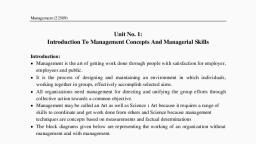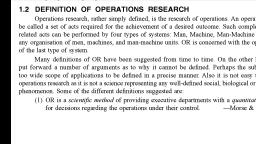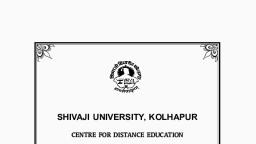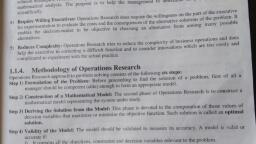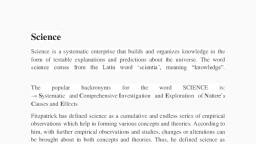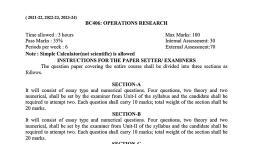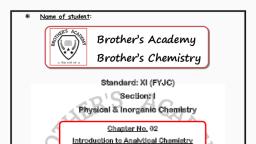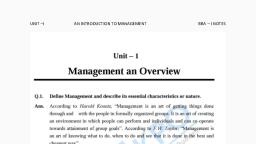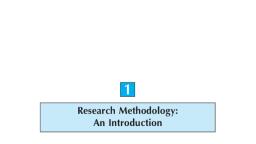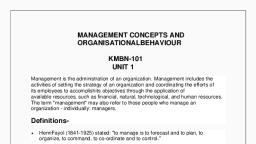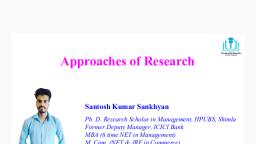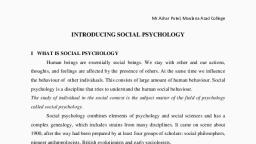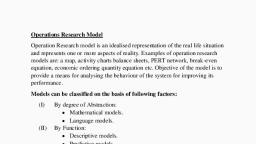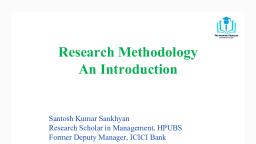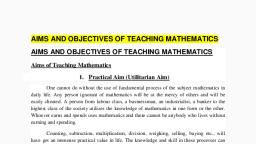Page 1 :
1.2 DEFINITION OF OPERATIONS RESEARCH, , Operations research, rather simply defined, is the research of operations. An operation may, be called a set of acts required for the achievement of a desired outcome. Such complex, interrelated acts can be performed by four types of systems: Man, Machine, Man-Machine unit and, any organisation of men, machines, and man-machine units. OR 1s concerned with the operations, of the last type of system., , Many definitions of OR have been suggested from time to time. On the other hand are, put forward a number of arguments as to why it cannot be defined. Perhaps the subject has, too wide scope of applications to be defined in a precise manner. Also it is not easy to define, operations research as it is not a science representing any well-defined social, biological or physical, phenomenon. Some of the different definitions suggested are:, , (1) OR 1s a scientific method of providing executive departments with a quantitative basis, for decisions regarding the operations under their control. —Morse & Kimball
Page 2 :
(2) OR, in the most general sense, can be characterised as the application of scientific, methods, tools and techniques to problems involving the operations of systems so as to, provide those in control of the operations with optimum solutions to the problems., , —Churchman, Ackoff, Amoff, , (3) Operations research is applied decision theory. It uses any scientific, mathematical or, logical means to attempt to cope with the problems that confront the executive when he, tries to achieve a thorough going rationality in dealing with his decision problems., , —Miller and Starr, (4) Operations research is a scientific approach to problem solving for executive, , management. —H.M. Wagner, (5) Operations research is the art of giving bad answers to problems, to which, otherwise,, worse answers are given. —Thomas L. Saaty, , (6) Operations research is the art of winning wars without actually fighting them., —Auther Clark, , (7) Operations research 1s an aid for the executive in making his decisions by providing him, with the needed quantitative information based on the scientific method of analysis.
Page 3 :
—AUUICT Uldaik, , (7) Operations research is an aid for the executive in making his decisions by providing him, with the needed quantitative information based on the scientific method of analysis., , —C Kittel, , (8) Operations research is the systematic, method-oriented study of the basic structure,, characteristics, functions and relationships of an organization to provide the executive, with a sound, scientific and quantitative basis for decision-making., , —E.L. Amoff & M.J. Netzorg, , (9) Operations research is the application of scientific methods to problems arising from, operations involving integrated systems of men, machines and materials. It normally, utilizes the knowkedge and skill of an interdisciplinary research team to provide the, managers of such systems with optimum operating solutions. —Fabrycky & Torgersen, , (10) Operations research is an experimental and applied science devoted to observing,, understanding and predicting the behaviour of purposeful man-machine systems; and, operations research workers are actively engaged in applying this knowledge to practical, problems in business, government and society., , —Operations Research Society of America, , AIn r~. ait a e a7W 3° a’? ras e ef? oan 714 e oe yy. e Be
Page 4 :
(11), , (12), , (13), , Operations research is the application of scientific method by interdisciplinary teams to, problems involving the control of organized (man-machine) systems so as to provide, solutions which best serve the purpose of the organization as a whole., , —Ackoff & Sasieni, , Operations research utilizes the planned approach (updated scientific method) and, an interdisciplinary team in order to represent complex functional relationships as, mathematical models for the purpose of providing a quantitative basis fo decisionmaking and uncovering new problems for quantitative analysis., , —Thierauf & Klekamp, , The most comprehensive and modern definition of operations research can be summarised, as below:, , O.R. is the application of modern methods of mathematical science to complex problems, involving management of large systems of men, machines, materials and money in, industry, business, government and defence. The distinctive approach is to develop a, scientific model of the system incorporating measurement of factors such as chance, and risk to predict and compare the outcomes of alternative decisions, strategies or, controls. —J.O.R. Society, U.K.
Page 5 :
1.3 CHARACTERISTICS OF OPERATIONS RESEARCH, , The various definitions of operations research presented in section 1.2 bring out the essential, , characteristics of operations research. They are, (i) its system (or executive) orientation,, (ii) the use of interdisciplinary teams,, (iii) application of scientific method,, (iv) uncovering of new problems,, (v) improvement in the quality of decisions,, (vi) use of computer,, (vii) quantitative solutions, and, , (viii) human factors., Let us consider each of these in some detail., , 1.3-1 System (or Executive) Orientation of OR, , One of the most important characteristics of OR study is its concern with problems as a, whole or its system orientation. This means that an activity by any part of an organization has, some effect on the activity of every other part. The optimum operation of one part of a system, , may nat ha tha anntimim anaratian far anma nthar nart Tharafara tr atraluata ant Aantnn nna

